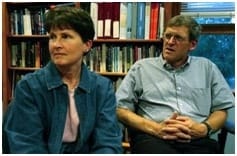
Bearing witness to Christ and loving people in his name is often costly and leads to suffering. That was the case with Tom Little and his team of eight aid workers who were killed in Afghanistan this August by the Taliban. Little’s wife Libby addressed the assembly this morning.
Little had worked in Afghanistan for more than 30 years. He traveled to the war torn country with the Christian aid group International Assistance Mission on a summer three week mission trip. They were there to do dental work, eye work, bringing a roving clinic to people with no access to this kind of care. Tom knew the risks, and felt called by God to go. He just did not realize the price of this trip. But it came through loud and clear this morning as his wife read from his blood stained sermon notes.
Today’s morning focus at Lausanne III here in Cape Town was on the love of Christ and suffering. John Piper gave the exposition of Ephesians 3. He reminded us out of that passage, that “the gospel is not going to spread without suffering and prayer, because the places that remain to be reached are largely places that don’t welcome Christians.” There won’t be spiritual breakthroughs without supernatural power that comes through prayer. And there won’t be break throughs without suffering. Of all things, the cross demonstrates this. So he urged the global church leaders who listened in to have a readiness to suffer and pray for the advancement of the gospel.
Piper then told the listeners, who have now heard story after story of brokenness and persecution, that we must alleviate human suffering in the name of Christ. Jesus calls us to this.
But he reminded participants that there are two kinds of suffering we must seek to alleviate.
Christ by his own suffering died on the cross to propitiate the wrath of God. The greatest problem of mankind in the universe is our lostness, and our being under the just wrath of God, bound for an everlasting suffering. But Christ died so that we might not perish forever and that anyone who believes in him might be saved.
Piper said that the global church must hold two truths about suffering. When the gospel takes root in our souls, it impels us outward to the alleviation of all human suffering we encounter. But then he added, that if the gospel really takes root in our souls, it will awaken us to the horrible reality of eternal suffering in hell under the wrath of a just God. This, he said, should impel us to rescue the perishing and cry “flee from the wrath of God” telling them that there is a place of rescue in the cross.
Piper said that some of us care only to alleviate the first kind of suffering; others only care about the second kind. He added, “what I want the global church to say is that for Christ’s sake, we Christians care about all suffering, especially eternal suffering!” He said we should not choose between these two truths. Christ does not want us to. But we must remember that everlasting hell is ten million times worse than anything we will experience here on earth.
As we treasure Christ, he said, Christians are called to take up Jesus cross and follow him. This may come with a price.
Following Piper, African Archbishop Benjamin Kwashi of Jos, Nigeria picked up the theme. He said that “we have a gospel worth living and dying for.” This is how the apostle Paul viewed his life. As Paul headed toward Jerusalem—he knew that prison and suffering awaited him. The archbishop also knows this personally. He told how angry Muslims burned 100 churches in his area, and destroyed 300 Christian homes and businesses. Some of his friends were roasted in their churches. He told his people not to strike back! At one point, he said, 40 people came to his home to kill him. But he was not there, so they beat his wife instead leaving her half dead and totally blind. A year later 30 more people came, broke into his home, dragged him out to kill him. He asked them if he could pray first. So he prostrated himself on the ground and cried out to God. They all left.
What caused them to leave? He said only eternity will reveal this. “Why am I alive? I do not know. But I know that I will die some day, by car crash or plane crash or a blood crash, I do not know how. But until that day, I have a gospel worthy living and dying for.”
He urged his listeners to not be ashamed of Christ, and to not be afraid to speak the truth in love.
